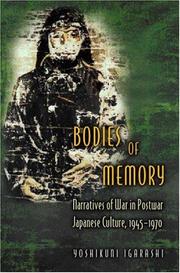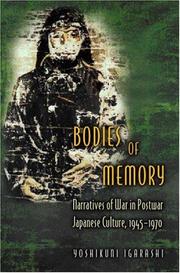| Listing 1 - 9 of 9 |
Sort by
|

ISBN: 0691049122 0691049114 Year: 2000 Publisher: Princeton Princeton university press
Abstract | Keywords | Export | Availability | Bookmark
 Loading...
Loading...Choose an application
- Reference Manager
- EndNote
- RefWorks (Direct export to RefWorks)
Japan and the United States became close political allies so quickly after the end of World War II, that it seemed as though the two countries had easily forgotten the war they had fought. Here Yoshikuni Igarashi offers a provocative look at how Japanese postwar society struggled to understand its war loss and the resulting national trauma, even as forces within the society sought to suppress these memories. Igarashi argues that Japan's nationhood survived the war's destruction in part through a popular culture that expressed memories of loss and devastation more readily than political discourse ever could. He shows how the desire to represent the past motivated Japan's cultural productions in the first twenty-five years of the postwar period. Japanese war experiences were often described through narrative devices that downplayed the war's disruptive effects on Japan's history. Rather than treat these narratives as obstacles to historical inquiry, Igarashi reads them along with counter-narratives that attempted to register the original impact of the war. He traces the tensions between remembering and forgetting by focusing on the body as the central site for Japan's production of the past. This approach leads to fascinating discussions of such diverse topics as the use of the atomic bomb, hygiene policies under the U.S. occupation, the monstrous body of Godzilla, the first Western professional wrestling matches in Japan, the transformation of Tokyo and the athletic body for the 1964 Tokyo Olympics, and the writer Yukio Mishima's dramatic suicide, while providing a fresh critical perspective on the war legacy of Japan.
J3000 --- J3384 --- J3389 --- Japan: History -- historiography, theory, methodology and philosophy --- Japan: History -- Gendai, modern -- Shōwa period -- World War II (1931-1945) --- Japan: History -- Gendai, modern -- Shōwa period -- World War II -- occupation period (1945-1952) --- Japan --- Civilization

ISBN: 1283379910 9786613379917 1400842980 9781400842988 0691049114 9780691049113 0691049122 9780691049120 9781283379915 6613379913 Year: 2012 Publisher: Princeton, NJ
Abstract | Keywords | Export | Availability | Bookmark
 Loading...
Loading...Choose an application
- Reference Manager
- EndNote
- RefWorks (Direct export to RefWorks)
Japan and the United States became close political allies so quickly after the end of World War II, that it seemed as though the two countries had easily forgotten the war they had fought. Here Yoshikuni Igarashi offers a provocative look at how Japanese postwar society struggled to understand its war loss and the resulting national trauma, even as forces within the society sought to suppress these memories. Igarashi argues that Japan's nationhood survived the war's destruction in part through a popular culture that expressed memories of loss and devastation more readily than political discourse ever could. He shows how the desire to represent the past motivated Japan's cultural productions in the first twenty-five years of the postwar period. Japanese war experiences were often described through narrative devices that downplayed the war's disruptive effects on Japan's history. Rather than treat these narratives as obstacles to historical inquiry, Igarashi reads them along with counter-narratives that attempted to register the original impact of the war. He traces the tensions between remembering and forgetting by focusing on the body as the central site for Japan's production of the past. This approach leads to fascinating discussions of such diverse topics as the use of the atomic bomb, hygiene policies under the U.S. occupation, the monstrous body of Godzilla, the first Western professional wrestling matches in Japan, the transformation of Tokyo and the athletic body for the 1964 Tokyo Olympics, and the writer Yukio Mishima's dramatic suicide, while providing a fresh critical perspective on the war legacy of Japan.
Japan --- Civilization --- HISTORY / Asia / Japan.
Book
ISBN: 9780231551380 Year: 2021 Publisher: New York, NY
Abstract | Keywords | Export | Availability | Bookmark
 Loading...
Loading...Choose an application
- Reference Manager
- EndNote
- RefWorks (Direct export to RefWorks)
By the early 1970s, Japan had become an affluent consumer society, riding a growing economy to widely shared prosperity. In the aftermath of the fiery political activism of 1968, the country settled down to the realization that consumer culture had taken a firm grip on Japanese society. Japan, 1972 takes an early-seventies year as a vantage point for understanding how Japanese society came to terms with cultural change. Yoshikuni Igarashi examines a broad selection of popular film, television, manga, and other media in order to analyze the ways Japanese culture grappled with this economic shift. He exposes the political underpinnings of mass culture and investigates deeper anxieties over questions of agency and masculinity. Igarashi underscores how the male-dominated culture industry strove to defend masculine identity by looking for an escape from the high-growth economy. He reads a range of cultural works that reveal perceptions of imperiled Japanese masculinity through depictions of heroes’ doomed struggles against what were seen as the stifling and feminizing effects of consumerism. Ranging from manga travelogues to war stories, yakuza films to New Left radicalism, Japan, 1972 sheds new light on a period of profound socioeconomic change and the counternarratives of masculinity that emerged to manage it.
Book
ISBN: 023155138X Year: 2021 Publisher: New York, New York State : Columbia University Press,
Abstract | Keywords | Export | Availability | Bookmark
 Loading...
Loading...Choose an application
- Reference Manager
- EndNote
- RefWorks (Direct export to RefWorks)
By the early 1970s, Japan had become an affluent consumer society, riding a growing economy to widely shared prosperity. In the aftermath of the fiery political activism of 1968, the country settled down to the realization that consumer culture had taken a firm grip on Japanese society. Japan, 1972 takes an early-seventies year as a vantage point for understanding how Japanese society came to terms with cultural change.Yoshikuni Igarashi examines a broad selection of popular film, television, manga, and other media in order to analyze the ways Japanese culture grappled with this economic shift. He exposes the political underpinnings of mass culture and investigates deeper anxieties over questions of agency and masculinity. Igarashi underscores how the male-dominated culture industry strove to defend masculine identity by looking for an escape from the high-growth economy. He reads a range of cultural works that reveal perceptions of imperiled Japanese masculinity through depictions of heroes’ doomed struggles against what were seen as the stifling and feminizing effects of consumerism. Ranging from manga travelogues to war stories, yakuza films to New Left radicalism, Japan, 1972 sheds new light on a period of profound socioeconomic change and the counternarratives of masculinity that emerged to manage it.
Masculinity --- Consumer behavior --- Japan --- Civilization
Book
ISBN: 9780231541350 023154135X 9780231177702 0231177704 Year: 2016 Publisher: La Vergne Columbia University Press
Abstract | Keywords | Export | Availability | Bookmark
 Loading...
Loading...Choose an application
- Reference Manager
- EndNote
- RefWorks (Direct export to RefWorks)
Soon after the end of World War II, a majority of the nearly 7 million Japanese civilians and serviceman who had been posted overseas returned home. Heeding the call to rebuild, these veterans helped remake Japan and enjoyed popularized accounts of their service. For those who took longer to be repatriated, such as the POWs detained in labor camps in Siberia and the fighters who spent years hiding in the jungles of islands in the South Pacific, returning home was more difficult. Their nation had moved on without them and resented the reminder of a humiliating, traumatizing defeat. Homecomings tells the story of these late-returning Japanese soldiers and their struggle to adapt to a newly peaceful and prosperous society. Some were more successful than others, but they all charted a common cultural terrain, one profoundly shaped by media representations of the earlier returnees. Japan had come to redefine its nationhood through these popular images. Yoshikuni Igarashi explores what Japanese society accepted and rejected, complicating the definition of a postwar consensus and prolonging the experience of war for both Japanese soldiers and the nation. He throws the postwar narrative of Japan's recovery into question, exposing the deeper, subtler damage done to a country that only belatedly faced the implications of its loss.
World War, 1939-1945 --- Repatriation --- Return migration --- Prisoners of war --- Forced repatriation --- History --- Prisoners and prisons, Soviet --- Japan --- Social conditions --- Forced repatriation. --- Prisoners and prisons, Soviet.
Digital
ISBN: 9780231551380 Year: 2021 Publisher: New York, N.Y. Columbia University Press
Abstract | Keywords | Export | Availability | Bookmark
 Loading...
Loading...Choose an application
- Reference Manager
- EndNote
- RefWorks (Direct export to RefWorks)

ISBN: 9781400842988 9780691049120 Year: 2012 Publisher: Princeton, N.J. Princeton University Press
Abstract | Keywords | Export | Availability | Bookmark
 Loading...
Loading...Choose an application
- Reference Manager
- EndNote
- RefWorks (Direct export to RefWorks)
Book

ISBN: 9780674274037 Year: 2007 Publisher: Cambridge, MA
Abstract | Keywords | Export | Availability | Bookmark
 Loading...
Loading...Choose an application
- Reference Manager
- EndNote
- RefWorks (Direct export to RefWorks)
Digital

ISBN: 9780674274037 Year: 2007 Publisher: Cambridge, Mass. Harvard University Press
Abstract | Keywords | Export | Availability | Bookmark
 Loading...
Loading...Choose an application
- Reference Manager
- EndNote
- RefWorks (Direct export to RefWorks)
| Listing 1 - 9 of 9 |
Sort by
|

 Search
Search Feedback
Feedback About UniCat
About UniCat  Help
Help News
News